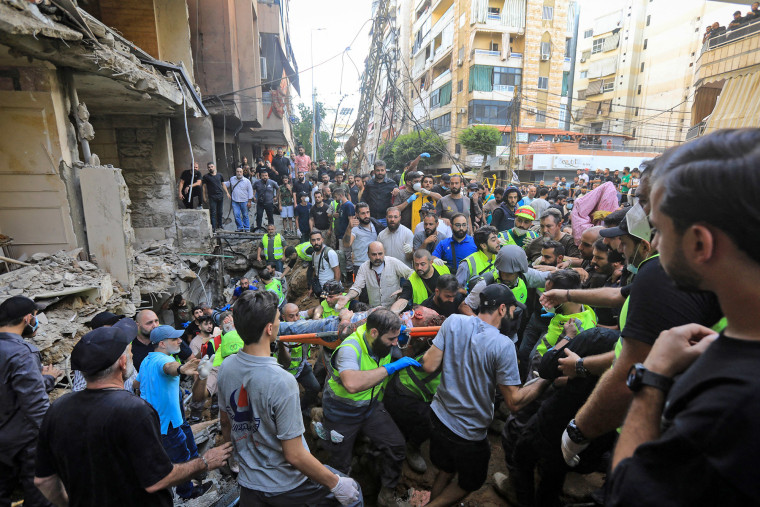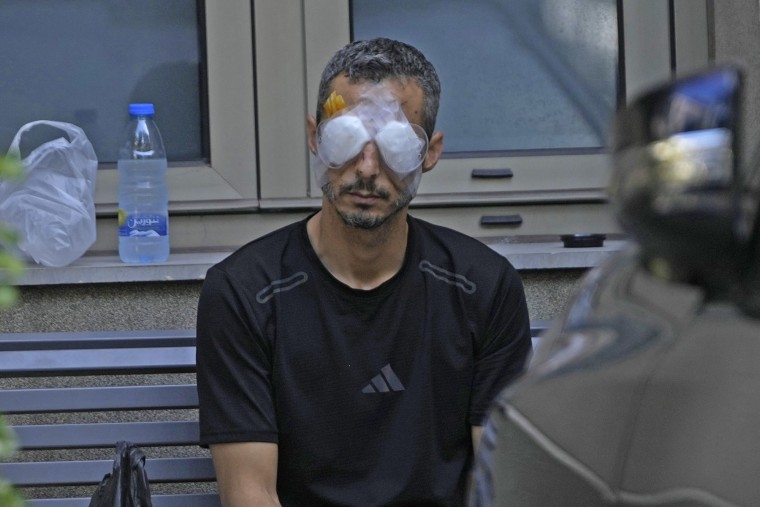Israel says it killed a top Hezbollah official in a “targeted strike” on the Lebanese capital of Beirut on Friday after Hezbollah unleashed an intense barrage of fire across the border following a wave of stunning attacks targeting the group’s communication devices.
The IDF claimed later on Friday it killed Ibrahim Aqil in the attack, who the Israeli military described as “the head of the Hezbollah terrorist organization’s operations.” The attack also killed 14 people and injured 66 others, according to the Lebanese National News Agency.
Hezbollah later confirmed the military commander’s death.
The prospect of an all-out war between the U.S. ally and the Iran-backed militant and political group appeared closer than ever, leaving the Middle East on edge as Hezbollah chief Hassan Nasrallah vowed revenge and Israel moved ahead with the “new phase” it said the conflict had entered.
The attacks earlier this week saw thousands of pagers and walkie-talkies used by Hezbollah operatives explode nearly simultaneously across Lebanon, killing at least 37 people, including two children, and injuring close to 3,000. Most of those injured were civilians, Lebanon’s health minister said Friday.
The blasts sowed fear and chaos across the nation, overwhelming hospitals and leaving people fearful of using electronic devices.
They also left a trail to companies in Asia and Europe, with authorities in Taiwan and Bulgaria on Friday playing down links to the complex operation.
Despite pleas for restraint from the U.S. and its allies, the two sides continued to escalate.
IDF strikes Beirut, Hezbollah strikes northern Israel
The Israeli military said Friday it had “conducted a targeted strike in Beirut” and later claimed to have eliminated Ibrahim Aqil in the attack.
IDF spokesperson Daniel Hagari said the strike also killed about 10 Hezbollah commanders, who he said are responsible for “actions against Israel on a daily basis.”
Fourteen people were killed and over 60 were injured in the strike on a southern suburb of Beirut, according to the Lebanese National News Agency. It’s not clear how many of the victims are civilians at this time.

The Lebanese National News Agency also reported that an Israeli warplane launched two missiles, targeting an apartment in the Al-Jamous area in the southern suburb of the capital.
NBC News could not verify those details.
The scenes were reminiscent of the Israeli airstrike in July that killed Fuad Shukr, a senior Hezbollah official.
Earlier the IDF had struck southern Lebanon, where its air force hit about 100 Hezbollah launchers and other infrastructure sites late Thursday it said were set to be fired at Israeli territory — one of the heaviest barrages on the area since the two sides began exchanging regular fire in the wake of the Hamas-led Oct. 7 terror attacks and Israel’s assault on the Gaza Strip.
Hezbollah said it responded by bombing an air defense base and military barracks in northern Israel early Friday. The IDF said approximately 140 launches were identified crossing from Lebanon into Israeli territory, with some successfully intercepted.
“Make no mistake: those who harm the people of Israel will pay the price,” Israel’s foreign ministry said on X, confirming “intensive Hezbollah rocket fire from Lebanon” toward northern Israel.
It came a day after the Hezbollah leader delivered his much-anticipated response to the device attacks.
“There is no doubt that we have been exposed to a major and severe security and humanitarian blow,” Nasrallah said in a televised address Thursday.

He accused Israel of an act of war against Lebanon, but stopped short of specifying how or when his group would retaliate.
“The enemy has crossed all red lines and all laws in this attack,” Nasrallah said, as Israeli warplanes flew above the Lebanese capital, Beirut, creating a deafening sonic boom.
A former senior Israeli security official told NBC News that the devices were detonated not as part of a strategic decision but because the Israeli military was trying to act while it was still possible to use the explosives.
“It became a kind of use-it-or-lose-it situation,” the former official said. Israel has not claimed responsibility for the attacks or directly commented on them.
But after months of mounting fears about a broader regional conflict, the device attacks came as Israel declared a “new phase” to its deadly but simmering conflict with Hezbollah, which has seen thousands of people displaced on both sides of the shared border.
The escalation was met with growing calls for restraint, with the United Nations peacekeeping force in south Lebanon urging Friday “all actors to immediately de-escalate.”
The U.N. Security Council is due to meet later Friday over the blasts.
The White House said Thursday the U.S. was “afraid and concerned about potential escalation” in the region, calling for an “achievable” and “urgent” diplomatic solution.
Meanwhile, lingering questions remained about how Israel could have planted explosives in thousands of pagers and walkie-talkies that were then distributed among Hezbollah operatives.
Companies in Taiwan and Japan, whose logos appeared on the devices that blew up, have deflected any suggestions of involvement.
Taiwan-based Gold Apollo said earlier this week that the devices were made by a Hungarian firm, BAC Consulting, that it said was authorized to use the company’s logo for product sales in certain regions.
But Hungarian officials said that BAC Consulting was just a trading intermediary. The company’s chief executive, Cristiana Bársony-Arcidiacono, confirmed to NBC News that her company worked with Gold Apollo. But when she was asked about the pagers, she said over the phone: “I don’t make the pagers. I am just the intermediate. I think you got it wrong.”
Taiwan’s Economy Minister Kuo Jyh-huei said Friday the parts in the pagers that exploded were not made in Taiwan, adding the case was being investigated by judicial authorities.
Bulgaria’s state security agency also said Friday it had “established incontrovertibly” that no pagers used in the Lebanon attack were imported to, exported from or made in Bulgaria after reports that a local company was involved in selling the pagers.
Reuters
,
Keir Simmons
and
Raf Sanchez
contributed
.






